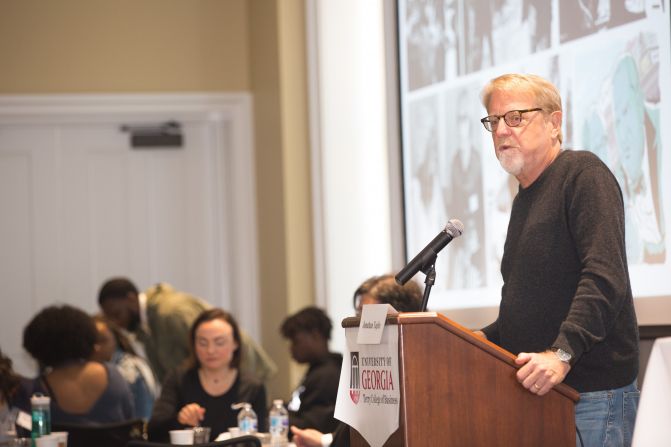Popular music, publishing and filmmaking were once in the hands of those who created them, but no longer. Tech giants have turned artists into unwilling contributors and user-generated content into free labor, according to an accomplished music and film producer.
During his Jan. 23 keynote address at the Music Business Program’s Artists’ Rights Symposium, Jonathan Taplin described how the libertarian philosophy that undergirds the operating principles of many big tech firms threatens artists’ rights in several mediums.
“It’s not like people stopped listening to music, reading books, going to movies or reading newspapers,” said Taplin, director emeritus of the Annenberg Innovation Lab at the University of Southern California. “It’s just that the money got reallocated from people who made content to the companies that own dominant platforms for accessing that content.”
Taplin is the author of Move Fast and Break Things: How Facebook, Google and Amazon Have Cornered Culture and Undermined Democracy and worked with Bob Dylan, George Harrison and Martin Scorsese. He said tech giants have become effective monopolies, muscling out rivals and offering bad deals to content creators who have nowhere else to go.
“What YouTube says to the music business is that your content is going to be on YouTube whether you want it to be or not. What you have to decide is if you want to sign a ‘license’ and get a tiny bit of advertising money or else let YouTube keep the advertising money,” he said. “That’s not a willing buyer-willing seller deal. That’s an extortion model, and it’s very successful.”
And those platforms rely on users, not artists, to generate their content, which often traffics in copyrighted material. To keep users uploading content, big tech companies purposely made their platforms addicting, Taplin said.
“The question we have to ask ourselves is, are you free if you look at your smartphone 250 times a day?”
That addiction ensures social media companies can acquire what they’re really after: Data.
“What business are these companies really in? They’re in the surveillance capitalism business. Data is the new oil,” Taplin said. “They want more data, and they want you to give it to them.”
More data leads to bigger and bigger companies, furthering their monopolistic practices, and Taplin suggested the cycle will continue until data monopolies are challenged in court.
“We have had a bunch of discussions that maybe antitrust … is outdated,” he said. “I’m going to make the argument that Silicon Valley couldn’t exist without antitrust. In 1956, there was a monopoly phone company called AT&T, and the government came in and said that in order to keep that monopoly, they would have to sign a consent decree to license — for free — every single patent they had. At the time, they had the patents for the transistor, the laser, the satellite, the semi-conductor — basically all the foundational patents of the digital age. So out of those free patents came Hewlett-Packard, Texas Instruments, Motorola, a bunch of others that started Silicon Valley.”
The same process repeated itself 20 years later, when IBM came under antitrust scrutiny and allowed another company to create software for its computers, resulting in Microsoft. Two decades later, a lawsuit against Microsoft and its Internet Explorer browser led to the creation of Google.
“So maybe we’re in a cycle where every 20 years or so there’s a change. The problem this time may be that the political influence of Google is so huge that it may be impossible. But after talking about this [book] for seven months, I sense a change,” Taplin said. “People are much more interested in thinking about the power of these platforms than they were.”
Taplin’s talk was the keynote address at the Artists’ Rights Symposium, sponsored by the Music Business Program at UGA’s Terry College of Business. The symposium was supported by Universal Music Group, the National Music Publishers’ Association and a State-of-the-Art Conference Grant from UGA’s Office of the Senior Vice President for Academic Affairs and Provost.

